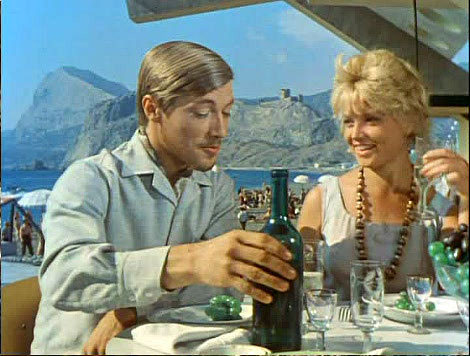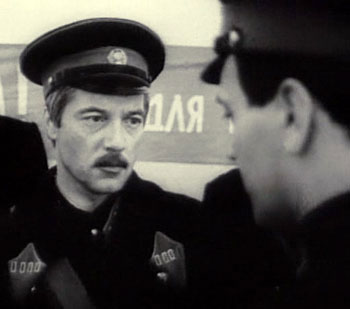
A Good Man Has Passed Away
/ Главная / Russkiy Mir Foundation / Publications / A Good Man Has Passed AwayA Good Man Has Passed Away
On Saturday January 21, actor Yevgeny Zharikov was buried at Troekurovskoe Cemetery. A star of many movies, he was one of the most recognizable faces of Soviet cinematograph. The actor’s business cards were his roles in three very different films: Ivan’s Childhood, a masterpiece by Tarkovsky, the comedy hit Three Plus Two and the monumental series about Soviet police titled Born by a Revolution.

On January 18, People’s Artist of Russia Yevgeny Zharikov died at age 70. In recent years he seldom turned up among his colleagues, almost never attended film festivals which he once loved and personally organized, because of his cruel disease.
Yevgeny Zharikov was born on February 26, 1941, in Moscow. The beginning of his career was enviable. He had not yet turned 20, when he starred in Yuli Raizman’s picture What If This Is Love? Later he made his famous debut in Andrei Tarkovsky’s Ivan’s Childhood, where Zharikov played the role of chief lieutenant Galtsev. The movie was the winner of the Viennese Film Festival and later became part of the world classics. The young actor was handsome, graceful and cinegenic. His could be the most incredible destiny, but each time things took an unpredictable turn. Many times he played Russian officers. He even acted as Voroshilov in First Cavalry and Marshal Malinovsky in the Hungarian movie Captain III. These were different movies, however, but the stamp of Tarkovsky never disappeared.
Zharikov was lucky: with his future wife Natalia Gvozdikova he studied at the renowned workshop of the All-Russian State Institute of Cinematography (VGIK) run by Sergey Gerasimov and Tamara Makarova, and graduated in 1964. This was a special caste and quality mark. Popularity came with the Three Plus Two comedy by Genrich Oganesyan, a hit of 1964, where Zharikov acted out a vocational romance alongside Andrei Mironov, Natalia Fateeva, Natalia Kustinskaya and Gennady Nilov after The Savages, a play by Sergey Mikhalkov.
Surprisingly enough, even after that he did not lend himself to any “replication.” There was no endless flow of similar characters. A rare chance fell to his lot, given that Soviet people were restricted from travel abroad in those days – to work in GDR at the DEFA studio.

The actor was a great help for those who was learning German, since he was filmed in an educational serial, playing out household scenes and plainest situations, favorable for memorizing the relevant vocabulary.
The number of series exceeded 60. Collaboration with DEFA continued in cinematograph. Zharikov acted in The Signals – a Polish-German movie. He was twice awarded the Silver Laurel Wreath by the GDR Television. Upon his return to Moscow Mr Zharikov worked again for the “Cinema Actor” Theatre Studio where he was invited like almost any VGIK graduates of those years. His filmography counts more than 50 roles in various movies, including The Secrets of Madam Wong, The Cap, Don’t Wake Up a Sleeping Dog, Your Fingers Smell Frankincense, The Gray Wolves, Cheap Novel, Lady Into Lassie, Love the Russian Way… There were quite a few trivial works too, often not through the actor’s fault, and also quite unexpected ones as in The Trotsky where he acted as Stalin. He also played in three Czech movies – The Dawn Was Breaking All Night Through, That Minute – That Instance and Two Boys Under Fire – and also returned to GDR on the occasion of acting in I want to See You – the film of 1977. However, several generations of Soviet people knew Yevgeny Zharikov as the true Soviet hero Nikolai Kondratyev in the series of the 1970’s Born by a Revolution where the main character is eventually promoted to General’s rank. This is the actor’s business card. For this work Zharikov was honored with the State Award of the USSR in 1978.
In the last years of his life Yevgeny was away from the shooting ground. He could hardly walk after a surgery, his leg hurt him badly. Yet he worked hard for the Guild of Russian Actors. For more than 10 years he was its president. He helmed the actors’ festival “Sozvezdie” (Constellation) and secured support and help for his colleagues, especially elderly and feeble ones. He was a cheerful, outgoing man who often went fishing or recreating with his numerous friends, not only fellow actors. He will always be remembered with gratitude and the bitterness about his premature departure.
Svetlana Khokhryakova
New publications

 Mikhail Kalatozov, a director who transformed the world of cinematography in many ways, was born 120 years ago. He was a Soviet film official and a propagandist. Above all, he was capable of producing movies that struck viewers with their power and poetic language.
Mikhail Kalatozov, a director who transformed the world of cinematography in many ways, was born 120 years ago. He was a Soviet film official and a propagandist. Above all, he was capable of producing movies that struck viewers with their power and poetic language.  Ukrainian authorities have launched a persecution campaign against the canonical Ukrainian Orthodox Church (UOC), the biggest one in the country's modern history. Over the past year, state sanctions were imposed on clergy representatives, searches were conducted in churches, clergymen were arrested, criminal cases were initiated, the activity of the UOC was banned in various regions of the country, and monasteries and churches were seized.
Ukrainian authorities have launched a persecution campaign against the canonical Ukrainian Orthodox Church (UOC), the biggest one in the country's modern history. Over the past year, state sanctions were imposed on clergy representatives, searches were conducted in churches, clergymen were arrested, criminal cases were initiated, the activity of the UOC was banned in various regions of the country, and monasteries and churches were seized.  When Nektary Kotlyaroff, a fourth-generation Russian Australian and founder of the Russian Orthodox Choir in Sydney, first visited Russia, the first person he spoke to was a cab driver at the airport. Having heard that Nektariy's ancestors left Russia more than 100 years ago, the driver was astonished, "How come you haven't forgotten the Russian language?" Nektary Kotlyaroff repeated his answer in an interview with the Russkiy Mir. His affinity to the Orthodox Church (many of his ancestors and relatives were priests) and the traditions of a large Russian family brought from Russia helped him to preserve the Russian language.
When Nektary Kotlyaroff, a fourth-generation Russian Australian and founder of the Russian Orthodox Choir in Sydney, first visited Russia, the first person he spoke to was a cab driver at the airport. Having heard that Nektariy's ancestors left Russia more than 100 years ago, the driver was astonished, "How come you haven't forgotten the Russian language?" Nektary Kotlyaroff repeated his answer in an interview with the Russkiy Mir. His affinity to the Orthodox Church (many of his ancestors and relatives were priests) and the traditions of a large Russian family brought from Russia helped him to preserve the Russian language.

 The leaders of the Friends of the Great Russia cultural association (Amici Della Grande Russia) in Italy believe that the Western policy of abolishing Russian culture in Europe has finally failed. Furthermore, it was doomed to failure from the beginning.
The leaders of the Friends of the Great Russia cultural association (Amici Della Grande Russia) in Italy believe that the Western policy of abolishing Russian culture in Europe has finally failed. Furthermore, it was doomed to failure from the beginning.  Name of Vladimir Nemirovich-Danchenko is inscribed in the history of Russian theater along with Konstantin Stanislavski, the other founding father of the Moscow Art Theater. Nevertheless, Mr. Nemirovich-Danchenko was a renowned writer, playwright, and theater teacher even before their famous meeting in the Slavic Bazaar restaurant. Furthermore, it was Mr. Nemirovich-Danchenko who came up with the idea of establishing a new "people's" theater believing that the theater could become a "department of public education."
Name of Vladimir Nemirovich-Danchenko is inscribed in the history of Russian theater along with Konstantin Stanislavski, the other founding father of the Moscow Art Theater. Nevertheless, Mr. Nemirovich-Danchenko was a renowned writer, playwright, and theater teacher even before their famous meeting in the Slavic Bazaar restaurant. Furthermore, it was Mr. Nemirovich-Danchenko who came up with the idea of establishing a new "people's" theater believing that the theater could become a "department of public education."  "Russia is a thing of which the intellect cannot conceive..." by Fyodor Tyutchev are famous among Russians at least. December marks the 220th anniversary of the poet's birth. Yet, he never considered poetry to be his life's mission and was preoccupied with matters of a global scale. Mr.Tyutchev fought his war focusing on relations between Russia and the West, the origins of mutual misunderstanding, and the origins of Russophobia. When you read his works today, it feels as though he saw things coming in a crystal ball...
"Russia is a thing of which the intellect cannot conceive..." by Fyodor Tyutchev are famous among Russians at least. December marks the 220th anniversary of the poet's birth. Yet, he never considered poetry to be his life's mission and was preoccupied with matters of a global scale. Mr.Tyutchev fought his war focusing on relations between Russia and the West, the origins of mutual misunderstanding, and the origins of Russophobia. When you read his works today, it feels as though he saw things coming in a crystal ball...